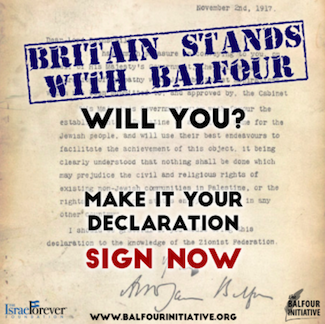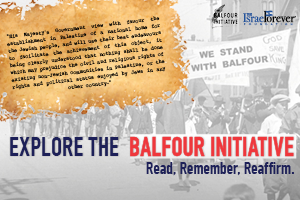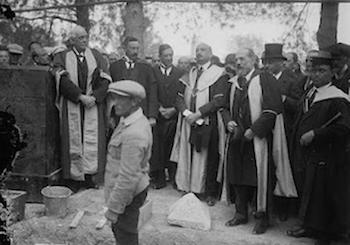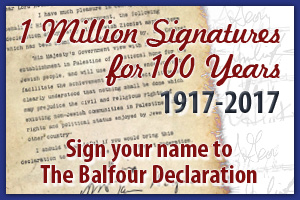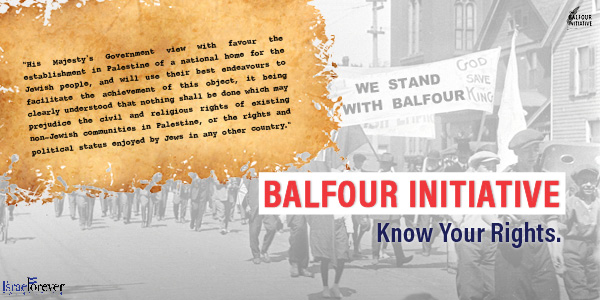Britain and Israel: A Tenuous Yet Vibrant History
by Dana Houri
The History of Jews in Britain
The history of the Jewish people in Britain dates back to 1066, following the Norman Conquest, when the Jews were first granted the rights to enter. Over the course of the following centuries, the relationship that the Jewish people share with Britain and its’ citizens has most definitely been a turbulent battle.
Unsurprisingly, as we have seen throughout Jewish history worldwide, the welcoming of Jews did not last long. The first signs of contention arose in 1144 with periodic attacks against the community, and by 1215 Jews were forced to wear a white piece of cloth shaped like the Ten Commandments, known as a tabula or “Jew Badge”, in order to separate them from the rest of society.
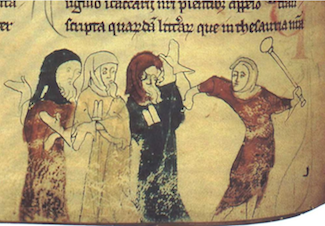
In 1233, the situation had become progressively worse and expulsions began taking place. It was not until 1656, under Cromwell’s Parliament, that Jews were allowed to re-establish themselves into the country and continue to do so today.
Throughout the years, British Jews have been able to maintain their religious beliefs, traditions and, most importantly, identities. This largely stems from Britain’s aim to create a society that supports the rights of all individuals, regardless of their background. Today, there is a thriving and diverse Jewish community in Britain, scattered between many communities, who have been able to fully integrate into society. Their commitment to their identity as Brits is cherished as deeply as their heritage as Jews.
The Balfour Impact
By 1917, British Jewry was well-situated in many arenas of social, political and economic activity. As they embraced their British allegiance, many also saw the importance and value of the Zionist movement. Thus, the announcement of the Balfour Declaration, which gave public validation of establishment of a Jewish national home, was of huge importance.
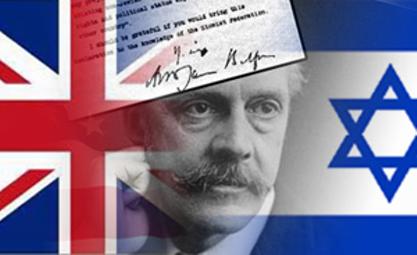
As we approach the 100 year anniversary of this monumental declaration, its significance is being increasingly recognised by both Israel and Britain, and worldwide. Whereas some are fighting to retract this historical sentiment of British support for Jewish nationalism, British Prime Minister Theresa May explained that it was ‘one of the most important letters in history’ and ‘it is an anniversary we will be marking with pride’. Addressing the British Parliament, both Baroness Ruth Deech and Rabbi Sacks shared powerful statements in favour of the commemoration that highlight not only the historical significance but also its contemporary relevance.
Palestine, Land of Israel: The British Mandate in Israel
Following World War One, the Ottoman Turks were forced to end their occupation in Palestine. In 1922, the League of Nations authorised Great Britain with the responsibility over the Mandate for Palestine, intended to facilitate the establishment of a Jewish national home. Effectively translating the Balfour Declaration into international law, under the Mandate, both Jewish and Arab communities would have the freedom to run their internal affairs and conduct their lives accordingly.
However, the reality of the situation in Palestine did not reflect what was once promised by the Mandate. Following an increased level of Arab opposition, the White Papers of 1930 and 1939 heavily restricted the immigration and acquisition of land by Jews. Many Zionists became frustrated by this and conflicts erupted between new Jewish settlers and the local Palestinian people leading to brutal fighting.
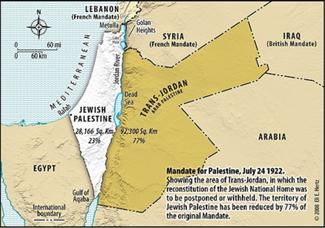
The situation was untenable for all parties involved, and culminated in the harrowing reality of the Exodus ship wherein 4554 Jews, survivors of the Holocaust, were attacked, forcibly escorted onto prison ships, and transported back to mainland Europe and displaced persons camps in Germany.
Consequently in 1947, the United Nations agreed upon a ‘Partition Plan of Palestine’ that would divide Palestine into two independent States; one for the Jews and the other for the Arabs in adjacent Transjordan. The British then announced the pending termination of its Mandate over Palestine, set to take place on the 15th May 1948.
On the evening prior, the State of Israel was proclaimed into existence by Ben Gurion only to be immediately rejected by Arab Leadership. In the first of many efforts to eradicate the State of Israel, despite its recognition by the nations of the world, many surrounding Arab countries invaded Palestine in what came to be called Israel’s War of Independence.
It is evident in Britain’s decision to abstain from voting, in relation to the establishment of Israel, that they did not want to publicly affiliate with a particular side. However, in private, the British attempted to help the Arabs by handing over many of their arms and forts. Yet, in a recent petition to make the UK apologise for the Balfour Declaration, Her Majesty’s Government released a statement explaining that “We are proud of our role in creating the State of Israel. The task now is to encourage moves towards peace.”
Current Support
Today, we see the support for Israel and the Jewish people from many important public figures within the UK. In recent years, David Cameron, Prime Minister at the time, spoke highly of the people of Israel in terms of their drive and aspiration leading them to innovate ‘around every problem that life has thrown at them’.
Theresa May, a firm supporter of Israel and friend of the Jewish community, has repeatedly demonstrated her commitment to the democracy and values of the Jewish State, praising the country’s continued effort to ensure the rights of all individuals as well as all of its’ humanitarian work.
This support extends beyond just words of praise when, in 2014, May banned French comedian, Dieudonne, from entering the UK on the basis of his virulent and hateful anti-Semitic views. In an unexpected act of shared commitment to defeating the rising tide of hatred against Jews in popular society, May was was also seen holding a “Je Suis Juif” placard following the Charlie Hebdo terrorist attacks. Outside of the public eye, May also shares a personal connection to Israel and her people. In a recent interview, she explained that she has a collection of around 100 cookbooks and her all time favourite is Ottolenghi.
In a democracy, however, we inevitably see two sides to every story with various political leaders expressing their anti-Israel or, possibly even, anti-Semitic views. The UK’s defense organisation, Community Security Trust, also recorded the highest amount of anti-Semitic incidents reaching a total of 1309 in 2016 and this most definitely needs to be addressed.
Britain continues to face challenges with its’ internal politics and the country is filled with varying perspectives on the current and ongoing situation in Israel. This continues to provide issues on what it means to be a British Jew and how these individuals are able to conduct their lives.
DISCUSSION QUESTIONS
- Is the history about Jews living in Britain sufficiently taught and known amongst British Jews? If not, why is this the case and how can this be improved?
- Most people, including British Jews, are not aware of the Jew badge or expulsions of the past. Do you think it is important that this becomes common knowledge?
- What do you believe it means to be a Jew living in Britain today? Does it carry any special responsibilities that every Jew should be aware of?
- Do you think that supporting Israel as a British Jew implies a “dual identity”? What implications might it have for young Jews, professionals, or Jewish educators?
- How can British Jews take greater pride in the national connection to Israel regardless of personal politics or ideologies?
- How can the general society better understand the long history of the British-Israel relationship, and what could be the focus of such messages to help them overcome the negative emphasis so prevalent in mainstream media representation?

Dana Houri is in her final year at the University of Bristol reading Accounting and Management. She is currently working with Israel Forever to promote the organization to the British Jewish community.

